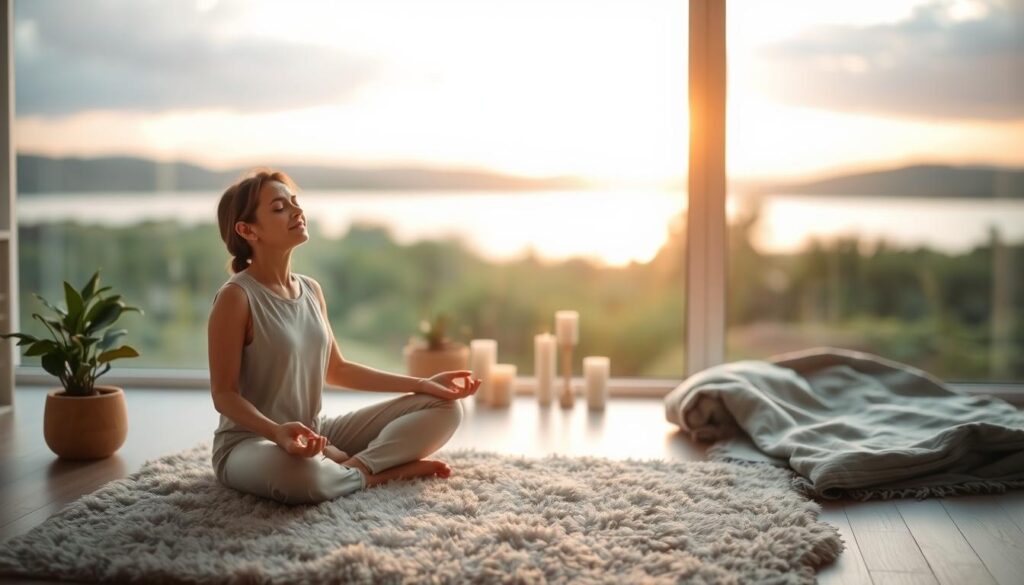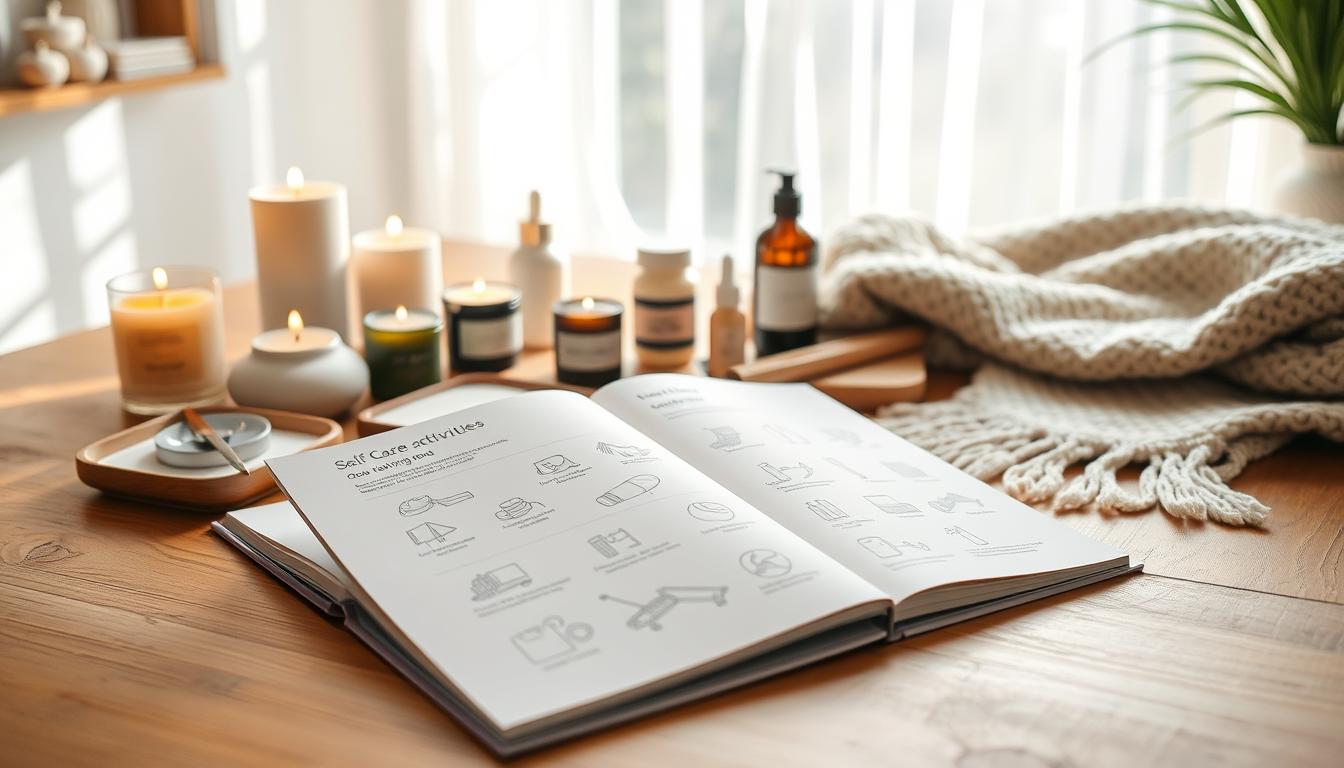Self-care tips Pin on Self care activities
Ever feel like you’re giving so much to others, but forget to give yourself the same care? Self-care isn’t about being perfect. It’s about making small, thoughtful choices that help you recharge. Think about starting your day with a stretch, writing down things you’re grateful for, or taking a walk outside.
These activities aren’t just nice to do; they’re good for you. They can lower stress, help you focus better, and even make your heart healthier. This guide will show you how to make these self-care activities a part of your daily life. https://naturalnicehealth.com/category/care-ideas/
Self-care is like having a toolkit for living your best life. It can be as simple as drinking water, taking breaks from screens, or helping others. This article will share self-care tips that are easy to fit into your busy schedule. You’ll learn how to improve your mental health without changing your whole life.
Table of Contents
Why Prioritizing Self-Care Matters for Your Wellbeing
Self-care is not a luxury, it’s a must. Science proves that small daily choices can change your mental health and life. Let’s look at why taking care of yourself is key to thriving.

The Science Behind Self-Care and Mental Health
Studies show self-care affects your brain and feelings. For example, physical touch like hugs or massages lowers stress hormones. Drinking black tea can even lower heart disease risks. These simple actions are not just habits; they’re tools to manage stress and protect your mental health.
How Self-Care Impacts Your Physical Health
Ignoring self-care tips can harm you. Only 23% of adults exercise enough, but just 30 minutes a day can cut anxiety in half. Good sleep boosts productivity by 20%, while poor boundaries increase stress-related illnesses by 30%. Taking care of your body is essential.
The Relationship Between Self-Care and Productivity
Employees who care for themselves are 33% happier at work. Taking breaks, setting limits, and managing stress improve focus and creativity. Simple actions like journaling or deep breathing can prevent burnout. When you care for yourself, you do better in all areas of life.
Understanding the Five Dimensions of Self-Care
Self-care isn’t a simple list. It’s a framework with five core dimensions that shape your well-being. Each area is unique but together they form a balanced self-care routine. Let’s explore each one:
- Physical: Feed your body with good food, exercise, and rest. Aim for 150 minutes of weekly activity, like brisk walks or yoga. Don’t forget sleep and regular health checks.
- Emotional: Recognize your feelings through journaling or talking to a friend. Mindfulness practices like meditation help manage stress and build resilience.
- Mental: Keep your mind active with books, podcasts, or puzzles. Creative activities like drawing or writing improve cognitive health and reduce mental fatigue.
- Social: Invest in relationships that uplift you. Make time for friends or join community groups. These self-care activities fight loneliness and build connections.
- Spiritual: Discover what gives your life meaning. This could be volunteering, meditating, or aligning actions with your values. It deepens purpose.
/ul
Ignoring any dimension can upset the balance. For instance, not exercising might drain your mental energy. Not caring for your emotions can harm your social connections. Begin with small steps—like a 10-minute walk, a gratitude journal entry, or a call to a friend. These small actions can build a strong routine that supports all aspects of your life.
Essential Self-Care Tips for Everyday Rejuvenation
Creating a self-care routine doesn’t need to take up a lot of time. Small, regular actions can have a big impact. Let’s look at self-care ideas for morning, midday, and evening to help you feel your best. https://naturalnicehealth.com/category/care-ideas/
Morning Self-Care Rituals to Start Your Day Right
Start your day with purpose. Here are some quick self-care tips for those with busy lives:
- Write three things you’re grateful for in a journal.
- Stretch for five minutes to wake up muscles and improve circulation.
- Sip herbal tea while planning your top three priorities for the day.
These simple steps help you begin the day with calm and focus.
Midday Reset Practices for Busy Schedules
Beat the afternoon slump with these energizing self-care ideas:
- Stand up and stretch for one minute every hour.
- Practice box breathing (inhale 4 counts, hold 4, exhale 4) at your desk.
- Take a 10-minute walk outside to boost vitamin D and mood.
These short breaks refresh your energy without losing focus.
Evening Routines to Unwind and Restore
Relax with these evening self-care practices:
- Power down screens 30 minutes before bed to improve sleep quality.
- Read a book in soft lighting to signal your brain it’s time to relax.
- Write down three accomplishments from your day to reinforce positivity.
Small habits like these help you ease into restful sleep. This is key for the 7–9 hours needed for good health.
Remember, tailor these self-care tips to your life. Even brief, regular practices build strength over time. Your well-being is most important—start small and grow from there.
Mindfulness Practices to Reduce Stress and Anxiety
When stress gets too much, simple mindfulness practices can help. These relaxation techniques work with your body to ease tension and improve focus. Let’s look at three effective methods to add to your daily routine.
Breath-Focused Techniques for Immediate Calm
Control your breath to stop stress fast. Try these methods:
- Box Breathing: Inhale for 4 counts, hold, exhale for 4 counts. A 2023 study shows this lowers heart rate within minutes.
- 4-7-8 Breathing: Inhale (4), hold (7), exhale (8). Reduces panic symptoms instantly.
- Alternate Nostril Breathing: Use fingers to guide airflow. Balances nervous system activity.
Body Scan Meditations for Tension Release
Lie down and mentally scan each body part. Notice sensations without judgment. A 2019 study found 20 minutes daily reduces physical and mental stress. Follow these steps:
- Close eyes and focus on toes, moving upward to shoulders.
- Note tightness without forcing change. Breathe into tense areas.
- Practice 10-15 minutes daily for lasting effects.
Mindful Movement Exercises for Mind-Body Connection
Combine movement with awareness for full-body stress management. Options include:
| Exercise | Key Benefits | Time Commitment |
|---|---|---|
| Yoga | Improves flexibility and emotional balance | 15-20 minutes |
| Tai Chi | Reduces cortisol levels | 10 minutes daily |
| Mindful Walking | Enhances focus while reducing anxiety | 5-10 minutes |
Studies show consistent practice builds resilience. Hinge Health members report a 58% drop in anxiety after adopting these methods. Even short sessions boost focus and emotional control. Remember: mindfulness is about progress, not perfection.
Creating a Personalized Self-Care Routine That Sticks
Starting a self-care routine that lasts means being honest with yourself. What makes you feel good might not be the same for others. Think about what drains your energy every day. Then, find small joys that you can turn into daily habits.
| Step | Action |
|---|---|
| 1 | Track your energy levels for a week. Note when you feel most stressed or fulfilled. |
| 2 | Pick 1–2 self-care activities linked to your findings. Example: a 10-minute stretch break if you sit all day. |
| 3 | Block time in your calendar like any priority. Even 5 minutes of deep breathing counts as a self-care tip. |
| 4 | Review your routine monthly. Adjust activities if they no longer feel nourishing. |
Being flexible is crucial. Many people skip self-care because they’re too busy. Start small. Research shows that daily practices of just 10 minutes are more effective than big plans. Use reminders and don’t be too hard on yourself. Your self-care plan is a tool for growth, not a task list.
It’s important to remember that many people feel guilty about taking care of themselves. Try to see self-care as a necessary part of your life, like brushing your teeth. Let these self-care tips help you create a routine that feels like a gift, not a burden.
Quick Self-Care Activities for When You’re Short on Time
Feeling stretched thin? Even a few minutes of self-care can recharge your energy. Science shows small practices add up—like the 1–2 minute desk meditation that lowers stress hormones. Let’s explore simple, actionable self-care ideas designed for your busy routine.
Five-Minute Self-Care Breaks
Try these micro-rituals to reset your day:
- 5-4-3-2-1 grounding technique: Name 5 things you see, 4 you can touch, 3 you hear, 2 scents, and 1 flavor. This calms overwhelm instantly.
- Deep breathing: Two minutes of diaphragmatic breathing lowers blood pressure and boosts focus.
- Gratitude burst: Jot down 3 things you’re grateful for—a practice shown to improve mood in under a minute.
Self-Care Ideas That Fit Into Your Commute
Turn travel time into a recharge zone:
- Listen to a 10-minute Peloton meditation class (their app offers sessions as short as 5 minutes).
- Play upbeat music or a podcast on mindfulness during your drive.
- Practice mindful observation: Notice colors, sounds, or patterns around you to stay present.
Multitasking-Friendly Self-Care Techniques
Blend care into daily tasks:
- While washing dishes, focus on the warmth of the water and scent of soap—a sensory reset.
- Turn walks to the mailbox into a “sunlight break” for vitamin D and mood-boosting endorphins.
- Replace scroll time with a 2-minute guided breath exercise on YouTube.
Remember: Self-care tips for busy individuals don’t need to be complicated. Start small and build habits that fit your life—your mind and body will thank you.
Overcoming Common Barriers to Self-Care Practice
The World Health Organization says self-care includes exercise and mental health strategies. But, many struggle with guilt or budget limits to start a self-care routine. Let’s face these challenges together.
Do you feel guilty about taking time for yourself? You’re not alone. A survey found 70% of parents feel ashamed for self-care. It’s not selfish to care for yourself.
Think of it like the airplane’s oxygen mask rule. You must care for yourself first to support others. Begin with small steps: a 5-minute deep breathing session or a short walk. Every moment counts.
Many self-care tips are free or low-cost. Try apps like Insight Timer for meditation or go for a park stroll. A 10-minute gratitude journal can also lift your mood, without spending a dime. Studies show these low-cost activities are just as effective.
For busy families, make self-care a part of daily life. Use bedtime stories as quiet time by letting kids choose calming books. Swap childcare duties with your partner for 30 minutes of alone time. Small changes can make family moments into shared self-care tips for busy individuals. Setting boundaries is key—say no to extra tasks and protect your time. Treat “me time” as any other appointment.
Remember, self-care isn’t about being perfect. Even 5 minutes of mindful breathing or a quick stretch can refresh you. Start today—your well-being is important.
Seasonal Self-Care Tips to Adapt Throughout the Year
Seasons change the light, temperature, and energy levels. So, your self-care activities need to change too. By matching your routines with nature’s cycles, you can feel more resilient and joyful. Here’s how to adjust:
Winter: Fight off the cold-weather blues with relaxation techniques like light therapy lamps. These mimic sunlight. Wear infrared apparel, like CELLIANT®-infused layers, to stay warm. Try cozy self-care ideas like reading by candlelight or making herbal tea.
Experts say getting 15–20 minutes of morning sunlight can help reset your sleep cycles.
Spring: Refresh with outdoor walks to get vitamin D and boost serotonin. Clear clutter with a “one-in, one-out” rule. Use neti pots or saline sprays for allergy relief. Try grounding practices like gardening or forest bathing.
Summer: Protect your skin with SPF 30+ and drink electrolyte-rich drinks to stay hydrated. Enjoy evening strolls to make the most of longer days. Wear UV-blocking sunglasses to protect your eyes. Join community events or picnics to stay connected.
Fall: Wear cozy fabrics for comfort and try journaling to ease transitions. Take nature walks to ground yourself. Enjoy seasonal soups or roasted veggies. Use essential oils like cinnamon or clove to lift your mood.
| Season | Key Focus | Science-Backed Benefits |
|---|---|---|
| Winter | Light therapy, indoor movement | 35% better sleep quality (Dr. Bhandari, 2024) |
| Spring | Outdoor time, decluttering | 25% mood boost from sunlight exposure |
| Summer | Hydration, socializing | 20% higher nutrient intake with seasonal eating |
| Fall | Journaling, grounding | 40% less anxiety with nature walks |
Small changes like these keep your self-care activities exciting. Let the seasons guide you—your mind and body will be grateful!
Conclusion: Embracing Self-Care as a Lifestyle, Not a Luxury
Remember Ferris Bueller’s advice to stop and look around? Self-care isn’t about big actions—it’s about small, daily steps. By adding self-care tips to your routine, you improve your mental health and handle stress better. Every little bit, like a five-minute meditation or a short walk, matters.
Self-care isn’t selfish. It’s key to dealing with life’s challenges with clarity and energy. Whether it’s exercise, mindfulness, or spending time with friends, caring for yourself helps you succeed. Even if you’re busy, small actions like quick workouts or taking breaks can make a big difference.
Studies show that small actions can help manage stress and build emotional strength. Begin today with a simple practice, like stretching in the morning or writing in a gratitude journal at night. Adjust as you go and celebrate your progress, not perfection. When life gets tough, go back to what works for you.
Your well-being is not a luxury. It’s what lets you live fully. By making self-care a part of your life, you create a world where happiness, purpose, and health are everyday experiences. What’s your first step? https://www.health.com/hand-pain-8619501
FAQ
What is self-care, and why is it important?
Self-care is more than just relaxing. It’s about doing things that make you feel good physically, mentally, and emotionally. In today’s busy world, it’s key to reduce stress and feel better about life.
How does self-care impact mental health?
Self-care can lower stress hormones and improve your mood. It might even help with anxiety and depression. Studies show it’s great for your mental health.
Can self-care improve physical health?
Yes! It can boost your immune system, help you sleep better, and even protect your heart. Taking care of your body and mind is very important.
Does self-care take away from productivity?
No, it actually helps you focus and be more creative. It prevents burnout, making you better at everything you do.
What are the five dimensions of self-care?
The five areas are physical (like eating right and exercising), emotional (dealing with feelings), mental (staying sharp), social (building relationships), and spiritual (finding meaning). A good self-care plan covers all these areas.
What are some simple self-care activities I can incorporate into my day?
Begin with gratitude, gentle stretches, or mindful eating. Take breaks with desk stretches or deep breathing. At night, relax with reading or sleep hygiene.
How can mindfulness practices help with stress management?
Mindfulness, like focused breathing, can calm you down. It connects your mind and body, helping you feel better overall.
How can I create a personalized self-care routine?
First, figure out what stresses you and what you need in each self-care area. Then, plan out your self-care and stay flexible to adjust as needed.
What if I have a busy schedule? How can I fit in self-care?
Try quick self-care like 5-minute stretches. Use your commute for self-care, like listening to podcasts. Even multitasking can be self-care, like being mindful while washing dishes.
Are there budget-friendly self-care options available?
Yes! You don’t need to spend a lot to take care of yourself. Nature walks, library trips, and free meditation apps are all great options for everyone.

